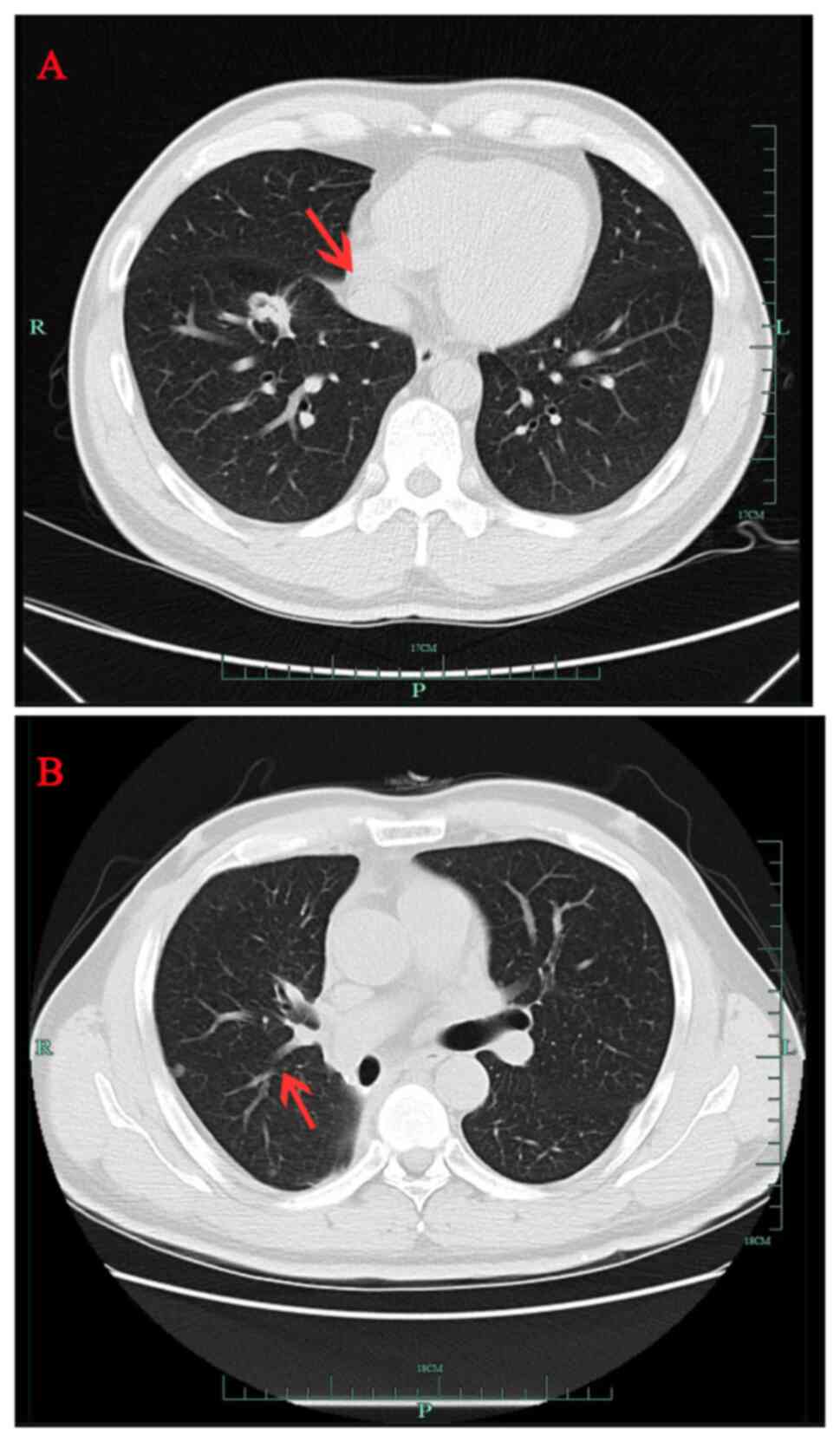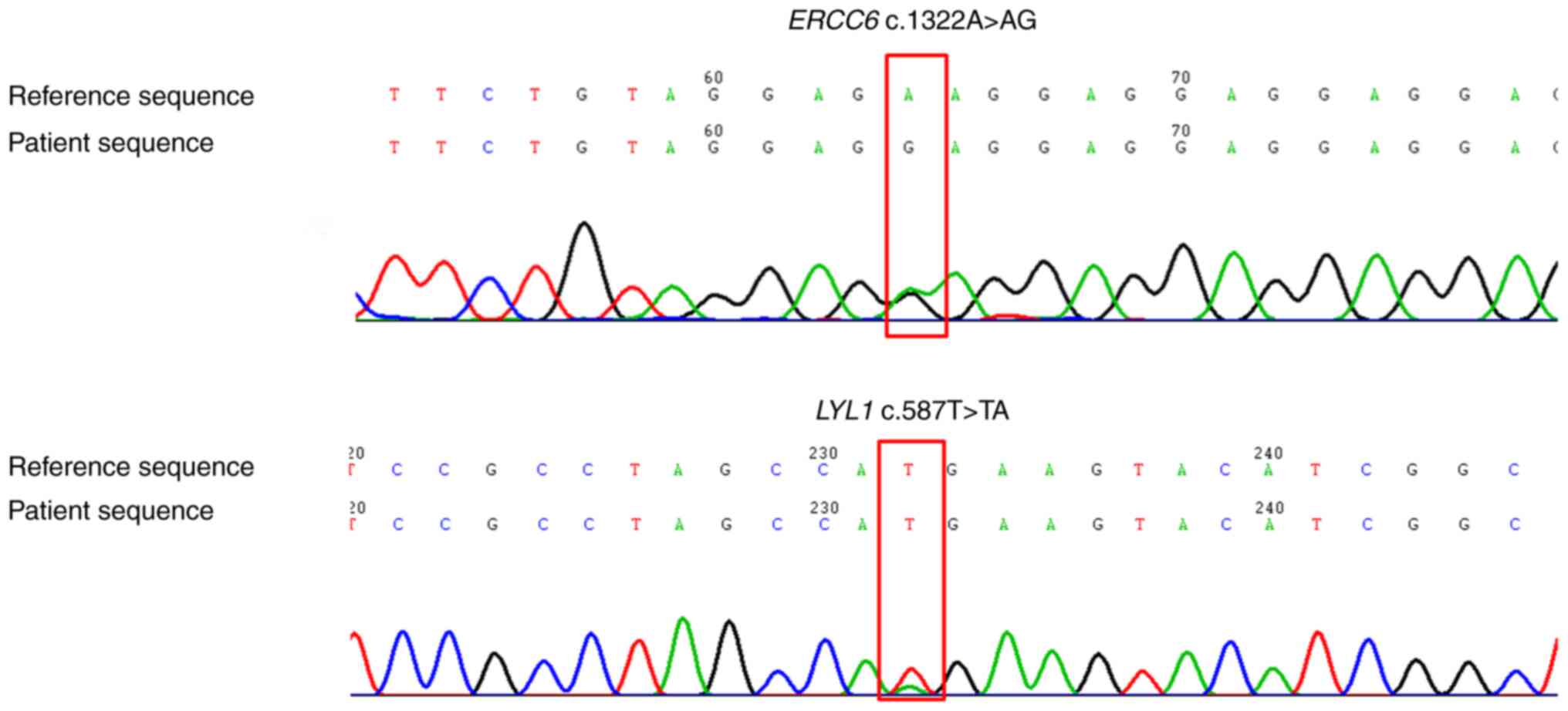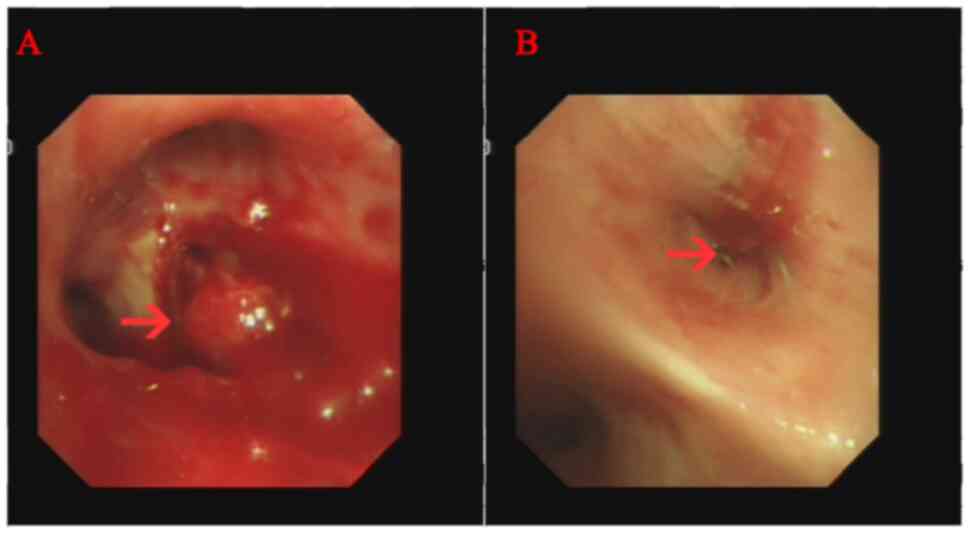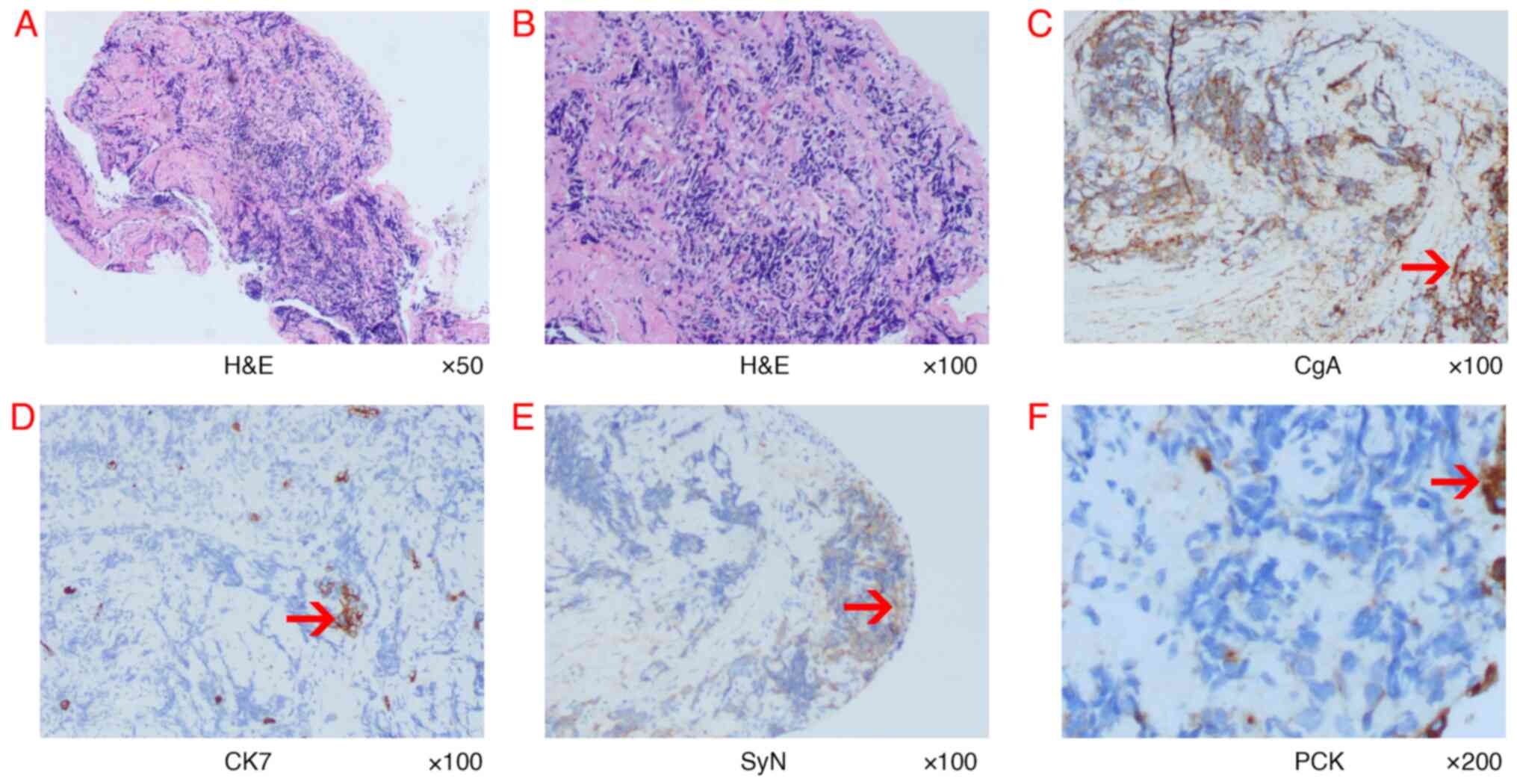|
1
|
Shah SA, Riaz U, Zahoor I, Jalil A and
Zubair M: Carcinoma multiplex. J Coll Physicians Surg Pak.
23:290–292. 2013.PubMed/NCBI
|
|
2
|
Owen LJ: Multiple malignant neoplasms.
JAMA. 76:1329–1333. 1921. View Article : Google Scholar
|
|
3
|
Coyte A, Morrison DS and McLoone P: Second
primary cancer risk-The impact of applying different definitions of
multiple primaries: Results from a retrospective population-based
cancer registry study. BMC Cancer. 14:1–11. 2014. View Article : Google Scholar : PubMed/NCBI
|
|
4
|
Buiatti E, Crocetti E, Acciai S, Gafà L,
Falcini F, Milandri C and La Rosa M: Incidence of second primary
cancers in three Italian population-based cancer registries. Eur J
Cancer. 33:1829–1834. 1997. View Article : Google Scholar : PubMed/NCBI
|
|
5
|
Weir HK, Johnson CJ and Thompson TD: The
effect of multiple primary rules on population-based cancer
survival. Cancer Causes Control. 24:1231–1242. 2013. View Article : Google Scholar : PubMed/NCBI
|
|
6
|
Rosso S, De Angelis R, Ciccolallo L,
Carrani E, Soerjomataram I, Grande E, Zigon G and Brenner H;
Eurocare Working Group, : Multiple tumours in survival estimates.
Eur J Cancer. 45:1080–1094. 2009. View Article : Google Scholar : PubMed/NCBI
|
|
7
|
Second primary cancers, . Victoria
Karaholios E, English D, Thursfield V and Simpson J:
2009.http://www.cancervic.org.au/downloads/cec/Second-Primary-Cancers.pdfAugust.
2009
|
|
8
|
Tsikitis VL, Wertheim BC and Guerrero MA:
Trends of incidence and survival of gastrointestinal neuroendocrine
tumors in the United States: A seer analysis. J Cancer. 3:2922012.
View Article : Google Scholar : PubMed/NCBI
|
|
9
|
Lynch SM, Heeran AB, Burke C, Lynam-Lennon
N, Eustace AJ, Dean K, Robson T, Rahman A and Marcone S: Precision
oncology, artificial intelligence, and novel therapeutic
advancements in the diagnosis, prevention, and treatment of cancer:
Highlights from the 59th Irish Association for Cancer Research
(IACR) Annual conference. Cancers (Basel). 16:19892024. View Article : Google Scholar : PubMed/NCBI
|
|
10
|
Vogt A, Schmid S, Heinimann K, Frick H,
Herrmann C, Cerny T and Omlin A: Multiple primary tumours:
Challenges and approaches, a review. ESMO Open. 2:e0001722017.
View Article : Google Scholar : PubMed/NCBI
|
|
11
|
Wood ME, Vogel V, Ng A, Foxhall L, Goodwin
P and Travis LB: Second malignant neoplasms: Assessment and
strategies for risk reduction. J Clin Oncol. 30:3734–3745. 2012.
View Article : Google Scholar : PubMed/NCBI
|
|
12
|
Bajdik CD, Abanto ZU, Spinelli JJ,
Brooks-Wilson A and Gallagher RP: Identifying related cancer types
based on their incidence among people with multiple cancers. Emerg
Themes Epidemiol. 3:172006. View Article : Google Scholar : PubMed/NCBI
|
|
13
|
Gaskin HS, Hardy RE and Fletcher RL:
Multiple primary malignancies in black patients. J Natl Med Assoc.
73:1065–1068. 1981.PubMed/NCBI
|
|
14
|
Donin N, Filson C, Drakaki A, Tan HJ,
Castillo A, Kwan L, Litwin M and Chamie K: Risk of second primary
malignancies among cancer survivors in the United States, 1992
through 2008. Cancer. 122:3075–3086. 2016. View Article : Google Scholar : PubMed/NCBI
|
|
15
|
AIRTUM Working Group, . Italian cancer
figures, report 2010: Cancer prevalence in Italy. Patients living
with cancer, long-term survivors and cured patients = Epidemiol
Prev. 34 (5–6 Suppl 2):S1–S188. 2010.(In English, Italian).
PubMed/NCBI
|
|
16
|
Hauben EI, Arends J, Vandenbroucke JP, van
Asperen CJ, Van Marck E and Hogendoorn PC: Multiple primary
malignancies in osteosarcoma patients. Incidence and predictive
value of osteosarcoma subtype for cancer syndromes related with
osteosarcoma. Eur J Hum Genet. 11:611–618. 2003. View Article : Google Scholar : PubMed/NCBI
|
|
17
|
Hu C, Hart SN, Gnanaolivu R, Huang H, Lee
KY, Na J, Gao C, Lilyquist J, Yadav S, Boddicker NJ, et al: A
population-based study of genes previously implicated in breast
cancer. N Engl J Med. 384:440–451. 2021. View Article : Google Scholar : PubMed/NCBI
|
|
18
|
Chubb D, Broderick P, Frampton M,
Kinnersley B, Sherborne A, Penegar S, Lloyd A, Ma YP, Dobbins SE
and Houlston RS: Genetic diagnosis of high-penetrance
susceptibility for colorectal cancer (CRC) is achievable for a high
proportion of familial CRC by exome sequencing. J Clin Oncol.
33:426–432. 2015. View Article : Google Scholar : PubMed/NCBI
|
|
19
|
Walsh T, Casadei S, Lee MK, Pennil CC,
Nord AS, Thornton AM, Roeb W, Agnew KJ, Stray SM, Wickramanayake A,
et al: Mutations in 12 genes for inherited ovarian, fallopian tube,
and peritoneal carcinoma identified by massively parallel
sequencing. Proc Natl Acad Sci USA. 108:18032–18037. 2011.
View Article : Google Scholar : PubMed/NCBI
|
|
20
|
Couch FJ, Nathanson KL and Offit K: Two
decades after BRCA: Setting paradigms in personalized cancer care
and prevention. Science. 343:1466–1470. 2014. View Article : Google Scholar : PubMed/NCBI
|
|
21
|
Mavaddat N, Peock S, Frost D, Ellis S,
Platte R, Fineberg E, Evans DG, Izatt L, Eeles RA, Adlard J, et al:
Cancer risks for BRCA1 and BRCA2 mutation carriers: Results from
prospective analysis of embrace. J Natl Cancer Inst. 105:812–822.
2013. View Article : Google Scholar : PubMed/NCBI
|
|
22
|
Greenberg S, Buys SS, Edwards SL, Espinel
W, Fraser A, Gammon A, Hafen B, Herget KA, Kohlmann W, Roundy C, et
al: Population prevalence of individuals meeting criteria for
hereditary breast and ovarian cancer testing. Cancer Med.
8:6789–6798. 2019. View Article : Google Scholar : PubMed/NCBI
|
|
23
|
Grosse SD, Rogowski WH, Ross LF, Cornel
MC, Dondorp WJ and Khoury MJ: Population screening for genetic
disorders in the 21st century: Evidence, economics, and ethics.
Public Health Genom. 13:106–115. 2010. View Article : Google Scholar : PubMed/NCBI
|
|
24
|
Schienda J and Stopfer J: Cancer genetic
counseling-current practice and future challenges. Cold Spring Harb
Perspect Med. 10:a0365412020. View Article : Google Scholar : PubMed/NCBI
|
|
25
|
Deng M, Chen HH, Zhu X, Luo M, Zhang K, Xu
CJ, Hu KM, Cheng P, Zhou JJ, Zheng S and Chen YD: Prevalence and
clinical outcomes of germline mutations in BRCA1/2 and PALB2 genes
in 2769 unselected breast cancer patients in China. Int J Cancer.
145:1517–1528. 2019. View Article : Google Scholar : PubMed/NCBI
|
|
26
|
Malkin D, Li FP, Strong LC, Fraumeni JF
Jr, Nelson CE, Kim DH, Kassel J, Gryka MA, Bischoff FZ, Tainsky MA,
et al: Germ line p53 mutations in a familial syndrome of breast
cancer, sarcomas, and other neoplasms. Science. 250:1233–1238.
1990. View Article : Google Scholar : PubMed/NCBI
|
|
27
|
Clark SK: Management of genetically
determined colorectal cancer. Surgeon. 17:165–171. 2019. View Article : Google Scholar : PubMed/NCBI
|
|
28
|
Aghabozorgi AS, Ebrahimi R, Bahiraee A,
Tehrani SS, Nabizadeh F, Setayesh L, Jafarzadeh-Esfehani R, Ferns
GA, Avan A and Rashidi Z: The genetic factors associated with Wnt
signaling pathway in colorectal cancer. Life Sci. 256:1180062020.
View Article : Google Scholar : PubMed/NCBI
|
|
29
|
Short E and Sampson J: The role of
inherited genetic variants in colorectal polyposis syndromes. Adv
Genet. 103:183–217. 2019. View Article : Google Scholar : PubMed/NCBI
|
|
30
|
Sekine Y, Iwasaki Y, Hakozaki N, Endo M,
Kamatani Y, Matsuda K, Murakami Y, Sano T, Akamatsu S, Kobayashi T,
et al: Prevalence and risk estimation of cancer-predisposing genes
for upper urinary tract urothelial carcinoma in Japanese. Jpn J
Clin Oncol. 52:1441–1445. 2022. View Article : Google Scholar : PubMed/NCBI
|
|
31
|
Siegel RL, Miller KD and Jemal A: Cancer
statistics, 2020. CA Cancer J Clin. 70:7–30. 2020. View Article : Google Scholar : PubMed/NCBI
|
|
32
|
Baysal BE, Willett-Brozick JE, Lawrence
EC, Drovdlic CM, Savul SA, McLeod DR, Yee HA, Brackmann DE,
Slattery WH III, Myers EN, et al: Prevalence of SDHB, SDHC, and
SDHD germline mutations in clinic patients with head and neck
paragangliomas. J Med Genet. 39:178–183. 2002. View Article : Google Scholar : PubMed/NCBI
|
|
33
|
Urbina-Jara LK, Rojas-Martinez A,
Martinez-Ledesma E, Aguilar D, Villarreal-Garza C and Ortiz-Lopez
R: Landscape of germline mutations in DNA repair genes for breast
cancer in Latin America: Opportunities for PARP-like inhibitors and
immunotherapy. Genes. 10:7862019. View Article : Google Scholar : PubMed/NCBI
|
|
34
|
Cancer survival rates, 2023, .
Nuffieldtrust. https://www.nuffieldtrust.org.uk/resource/cancer-survival-ratesJune
27–2023
|
|
35
|
Zhao Z, Sun K, Yan T, Wei R and Guo W:
Multiple primary tumors: A case report and review of the
literature. BMC Musculoskelet Disord. 21:3942020. View Article : Google Scholar : PubMed/NCBI
|
|
36
|
de Pooter RF, Dias S, Chowdhury M, Bartom
ET, Okoreeh MK, Sigvardsson M and Kee BL: Cutting Edge:
Lymphomyeloid-primed progenitor cell fates are controlled by the
transcription factor tal1. J Immunol. 202:2837–2842. 2019.
View Article : Google Scholar : PubMed/NCBI
|
|
37
|
Ma H, Hu Z, Wang H, Jin G, Wang Y, Sun W,
Chen D, Tian T, Jin L, Wei Q, et al: ERCC6/CSB gene polymorphisms
and lung cancer risk. Cancer Lett. 273:172–176. 2009. View Article : Google Scholar : PubMed/NCBI
|
|
38
|
Rami-Porta R, Bolejack V, Crowley J, Ball
D, Kim J, Lyons G, Rice T, Suzuki K, Thomas CF Jr, Travis WD, et
al: The lASLC lung cancer staging project: Proposals for the
Revisions of the T Descriptors in the Forthcoming Eighth edition of
the TNM classification for lung cancer. J Thorac Oncol.
10:990–1003. 2015. View Article : Google Scholar : PubMed/NCBI
|
|
39
|
Mandelker D, Zhang L, Kemel Y, Stadler ZK,
Joseph V, Zehir A, Pradhan N, Arnold A, Walsh MF, Li Y, et al:
Mutation detection in patients with advanced cancer by universal
sequencing of cancer-related genes in tumor and normal DNA vs
guideline-based germline testing. JAMA. 318:825–835. 2017.
View Article : Google Scholar : PubMed/NCBI
|
|
40
|
Zhang J, Walsh MF, Wu G, Edmonson MN,
Gruber TA, Easton J, Hedges D, Ma X, Zhou X, Yergeau DA, et al:
Germline mutations in predisposition genes in pediatric cancer. N
Engl J Med. 373:2336–2346. 2015. View Article : Google Scholar : PubMed/NCBI
|
|
41
|
Schrader KA, Cheng DT, Joseph V, Prasad M,
Walsh M, Zehir A, Ni A, Thomas T, Benayed R, Ashraf A, et al:
Germline variants in targeted tumor sequencing using matched normal
DNA. JAMA Oncol. 2:104–111. 2016. View Article : Google Scholar : PubMed/NCBI
|
|
42
|
Domchek SM: Germline genetic testing for
breast cancer: Which patients? What genes? Genet Med. 22:698–700.
2020. View Article : Google Scholar : PubMed/NCBI
|
|
43
|
Konstantinopoulos PA, Norquist B,
Lacchetti C, Armstrong D, Grisham RN, Goodfellow PJ, Kohn EC,
Levine DA, Liu JF, Lu KH, et al: Germline and somatic tumor testing
in epithelial ovarian cancer: ASCO guideline. J Clin Oncol.
38:1222–1245. 2020. View Article : Google Scholar : PubMed/NCBI
|
|
44
|
Chakravarty D and Solit DB: Clinical
cancer genomic profiling. Nat Rev Genet. 22:483–501. 2021.
View Article : Google Scholar : PubMed/NCBI
|
|
45
|
Troelstra C, van Gool A, de Wit J,
Vermeulen W, Bootsma D and Hoeijmakers JH: ERCC6, a member of a
subfamily of putative helicases, is involved in Cockayne's syndrome
and preferential repair of active genes. Cell. 71:939–953. 1992.
View Article : Google Scholar : PubMed/NCBI
|
|
46
|
Meira LB, Graham JM Jr, Greenberg CR,
Busch DB, Doughty AT, Ziffer DW, Coleman DM, Savre-Train I and
Friedberg EC: Manitoba aboriginal kindred with original
Cerebro-Oculo-Facio-Skeletal syndrome has a mutation in the
Cockayne syndrome group B (CSB) gene. Am J Hum Genet. 66:1221–1228.
2000. View
Article : Google Scholar : PubMed/NCBI
|
|
47
|
Berndt SI, Platz EA, Fallin MD, Thuita LW,
Hoffman SC and Helzlsouer KJ: Genetic variation in the nucleotide
excision repair pathway and colorectal cancer risk. Cancer
Epidemiol Biomarkers Prev. 15:2263–2269. 2006. View Article : Google Scholar : PubMed/NCBI
|
|
48
|
Chiu CF, Tsai MH, Tseng HC, Wang CL, Tsai
FJ, Lin CC and Bau DT: A novel single nucleotide polymorphism in
ERCC6 gene is associated with oral cancer susceptibility in
Taiwanese patients. Oral Oncol. 44:582–586. 2008. View Article : Google Scholar : PubMed/NCBI
|
|
49
|
Lin Z, Zhang X, Tuo J, Guo Y, Green B,
Chan CC, Tan W, Huang Y, Ling W, Kadlubar FF, et al: A variant of
the Cockayne syndrome B gene ERCC6 confers risk of lung cancer. Hum
Mutat. 29:113–122. 2008. View Article : Google Scholar : PubMed/NCBI
|
|
50
|
Gu J, Zhao H, Dinney CP, Zhu Y, Leibovici
D, Bermejo CE, Grossman HB and Wu X: Nucleotide excision repair
gene polymorphisms and recurrence after treatment for superficial
bladder cancer. Clin Cancer Res. 11:1408–1415. 2005. View Article : Google Scholar : PubMed/NCBI
|
|
51
|
Ma H, Hu Z, Wang H, Jin G, Wang Y, Sun W,
Chen D, Tian T, Jin L, Wei Q, et al: ERCC6/CSB gene polymorphisms
and lung cancer risk. Cancer Lett. 273:172–176. 2009. View Article : Google Scholar : PubMed/NCBI
|
|
52
|
Wilson NK, Foster SD, Wang X, Knezevic K,
Schütte J, Kaimakis P, Chilarska PM, Kinston S, Ouwehand WH,
Dzierzak E, et al: Combinatorial transcriptional control in blood
stem/progenitor cells: Genome-wide analysis of ten major
transcriptional regulators. Cell Stem Cell. 7:532–544. 2010.
View Article : Google Scholar : PubMed/NCBI
|
|
53
|
Souroullas GP, Salmon JM, Sablitzky F,
Curtis DJ and Goodell MA: Adult hematopoietic stem and progenitor
cells require either Lyl1 or Scl for survival. Cell Stem Cell.
4:180–186. 2009. View Article : Google Scholar : PubMed/NCBI
|
|
54
|
Mellentin JD, Smith SD and Cleary ML:
Lyl-1, a novel gene altered by chromosomal translocation in T cell
leukemia, codes for a protein with a helix-loop-helix DNA binding
motif. Cell. 58:77–83. 1989. View Article : Google Scholar : PubMed/NCBI
|
|
55
|
Meng YS, Khoury H, Dick JE and Minden MD:
Oncogenic potential of the transcription factor LYL1 in acute
myeloblastic leukemia. Leukemia. 19:1941–1947. 2005. View Article : Google Scholar : PubMed/NCBI
|
|
56
|
Natkunam Y, Zhao S, Mason DY, Chen J,
Taidi B, Jones M, Hammer AS, Hamilton Dutoit S, Lossos IS and Levy
R: The oncoprotein LMO2 is expressed in normal germinal-center B
cells and in human B-cell lymphomas. Blood. 109:1636–1642. 2007.
View Article : Google Scholar : PubMed/NCBI
|
|
57
|
Kwiatkowski N, Zhang T, Rahl PB, Abraham
BJ, Reddy J, Ficarro SB, Dastur A, Amzallag A, Ramaswamy S, Tesar
B, et al: Targeting transcription regulation in cancer with a
covalent CDK7 inhibitor. Nature. 511:616–620. 2014. View Article : Google Scholar : PubMed/NCBI
|
|
58
|
Sang X, Zhang Y, Fang F, Gao L, Tao Y, Li
X, Zhang Z, Wang J, Tian Y, Li Z, et al: BRD4 Inhibitor GNE-987
exerts anticancer effects by targeting super-enhancer-related gene
LYL1 in acute myeloid leukemia. J Immunol Res. 2022:79124842022.
View Article : Google Scholar : PubMed/NCBI
|
|
59
|
Miyamoto A, Cui X, Naumovski L and Cleary
ML: Helix-loop-helix proteins LYL1 and E2a form heterodimeric
complexes with distinctive DNA-binding properties in hematolymphoid
cells. Mol Cell Biol. 16:2394–2401. 1996. View Article : Google Scholar : PubMed/NCBI
|
|
60
|
Sanda T, Lawton LN, Barrasa MI, Fan ZP,
Kohlhammer H, Gutierrez A, Ma W, Tatarek J, Ahn Y, Kelliher MA, et
al: Core transcriptional regulatory circuit controlled by the TAL1
complex in human T cell acute lymphoblastic leukemia. Cancer Cell.
22:209–221. 2012. View Article : Google Scholar : PubMed/NCBI
|
|
61
|
Thoms JAI, Truong P, Subramanian S,
Knezevic K, Harvey G, Huang Y, Seneviratne JA, Carter DR, Joshi S,
Skhinas J, et al: Disruption of a GATA2-TAL1-ERG regulatory circuit
promotes erythroid transition in healthy and leukemic stem cells.
Blood. 138:1441–1455. 2021. View Article : Google Scholar : PubMed/NCBI
|
|
62
|
Griesinger F, Metz M, Trümper L, Schulz T
and Haase D: Secondary leukaemia after cure for locally advanced
NSCLC: Alkylating type secondary leukaemia after induction therapy
with docetaxel and carboplatin for NSCLC IIIB. Lung Cancer.
44:261–265. 2004. View Article : Google Scholar : PubMed/NCBI
|
|
63
|
Varadarajan R, Ford L, Sait SNJ, Block AW,
Barcos M, Wallace PK, Ramnath N, Wang ES and Wetzler M:
Metachronous and synchronous presentation of acute myeloid leukemia
and lung cancer. Leuk Res. 33:1208–1211. 2009. View Article : Google Scholar : PubMed/NCBI
|
|
64
|
Chan JM, Quintanal-Villalonga Á, Gao VR,
Xie Y, Allaj V, Chaudhary O, Masilionis I, Egger J, Chow A, Walle
T, et al: Signatures of plasticity, metastasis, and
immunosuppression in an atlas of human small cell lung cancer.
Cancer Cell. 39:1479–1496. 2021. View Article : Google Scholar : PubMed/NCBI
|
|
65
|
Guo X, Zhang Y, Zheng L, Zheng C, Song J,
Zhang Q, Kang B, Liu Z, Jin L, Xing R, et al: Global
characterization of T cells in non-small-cell lung cancer by
single-cell sequencing. Nature Med. 24:978–985. 2018. View Article : Google Scholar : PubMed/NCBI
|
|
66
|
Hackshaw AK, Law MR and Wald NJ: The
accumulated evidence on lung cancer and environmental tobacco
smoke. BMJ. 315:980–988. 1997. View Article : Google Scholar : PubMed/NCBI
|
|
67
|
Jang HJ, Min HY, Kang YP, Boo HJ, Kim J,
Ahn JH, Oh SH, Jung JH, Park CS, Park JS, et al: Tobacco-induced
hyperglycemia promotes lung cancer progression via cancer
cell-macrophage interaction through paracrine IGF2/IR/NPM1-driven
PD-L1 expression. Nat Commun. 15:49092024. View Article : Google Scholar : PubMed/NCBI
|
|
68
|
Zhong L, Goldberg MS, Parent ME and Hanley
JA: Exposure to environmental tobacco smoke and the risk of lung
cancer: A meta-analysis. Lung Cancer. 27:3–18. 2000. View Article : Google Scholar : PubMed/NCBI
|
|
69
|
Hecht SS: Tobacco smoke carcinogens and
lung cancer. J Natl Cancer Inst. 91:1194–1210. 1999. View Article : Google Scholar : PubMed/NCBI
|
|
70
|
Adler S, Yip R, Chan H, Cai Q, Zhu Y,
Triphuridet N, Kaufman A, Taioli E, Flores R, Henschke CI, et al:
Comparison of lung cancer aggressiveness in patients who never
smoked compared to those who smoked. Lung Cancer. 171:90–96. 2022.
View Article : Google Scholar : PubMed/NCBI
|
|
71
|
Gradishar WJ, Moran MS, Abraham J,
Abramson V, Aft R, Agnese D, Allison KH, Anderson B, Burstein HJ,
Chew H, et al: NCCN Guidelines® insights: Breast cancer,
version 4. J Natl Compr Canc Netw. 21:594–608. 2023. View Article : Google Scholar : PubMed/NCBI
|
|
72
|
Parsons MT, de la Hoya M, Richardson ME,
Tudini E, Anderson M, Berkofsky-Fessler W, Caputo SM, Chan RC,
Cline MS, Feng BJ, et al: Evidence-based recommendations for
gene-specific ACMG/AMP variant classification from the ClinGen
ENIGMA BRCA1 and BRCA2 Variant Curation expert panel. Am J Hum
Genet. 111:2044–2058. 2024. View Article : Google Scholar : PubMed/NCBI
|
|
73
|
Pal T, Agnese D, Daly M, La Spada A,
Litton J, Wick M, Klugman S, Esplin ED and Jarvik GP; Professional
Practice Guidelines Committee, : Points to consider: Is there
evidence to support BRCA1/2 and other inherited breast cancer
genetic testing for all breast cancer patients? A statement of the
American College of Medical Genetics and Genomics (ACMG). Genet
Med. 22:681–685. 2020. View Article : Google Scholar : PubMed/NCBI
|
|
74
|
Lucas AL, Fu Y, Labiner AJ, Dimaio CJ,
Sethi A and Kastrinos F: Frequent Abnormal pancreas imaging in
patients with pathogenic ATM, BRCA1, BRCA2, and PALB2 breast cancer
susceptibility variants. Clin Gastroenterol Hepatol. 21:2686–2688.
2023. View Article : Google Scholar : PubMed/NCBI
|
|
75
|
Narod SA and Giannakeas V: In response to
‘Pregnancy after breast cancer in patients with germline BRCA
mutations’. J Clin Oncol. 38:43522020. View Article : Google Scholar : PubMed/NCBI
|


















